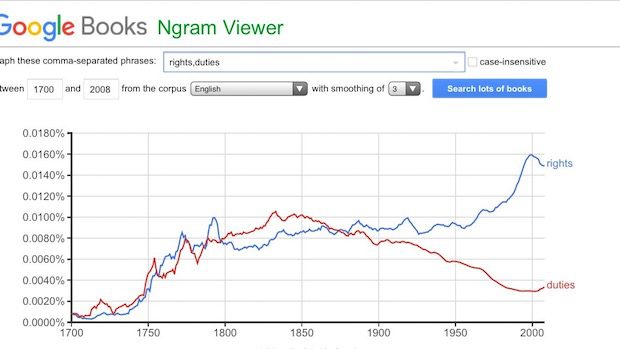Twilight Of The Elites — And The Rest Of Us

If you read nothing else today, read TAC editor Bob Merry’s powerful piece explaining why removing Trump cannot solve the crisis gripping America. Excerpts:
America is in crisis. It is a crisis of greater magnitude than any the country has faced in its history, with the exception of the Civil War. It is a crisis long in the making—and likely to be with us long into the future. It is a crisis so thoroughly rooted in the American polity that it’s difficult to see how it can be resolved in any kind of smooth or even peaceful way. Looking to the future from this particular point in time, just about every possible course of action appears certain to deepen the crisis.
What is it? Some believe it stems specifically from the election of Donald Trump, a man supremely unfit for the presidency, and will abate when he can be removed from office. These people are right about one thing: Trump is supremely unfit for his White House job. But that isn’t the central crisis; it is merely a symptom of it, though it seems increasingly to be reaching crisis proportions of its own.
Seriously, read the whole thing. Merry talks in detail about the failures of American elites, Democrats and Republicans both, to govern the country for the sake of the common good. It’s important to remember that if Trump were to go, the nation would be governed by Mike Pence, a thoroughly conventional Republican, and by a Congress in the hands of a Republican Party that has shown few if any signs of having understood the meaning of the Trump election. In other words, pretty much more of the thing we had during the Bush administration — as we would have had the third term of the Obama administration (minus the president’s personal integrity) had Hillary won.
I would broader Merry’s critique. It’s not merely a problem of the elites, but something that has engulfed us all. Here’s commenter Sam M. reacting to the Chris Arnade piece about drug-ridden Portsmouth, Ohio, that I posted last night:
““You around family members who use, around friends who use. When you start using drugs you are accepted for who you are, including your imperfections. For many people, myself, that is hard to stay away from.” [<– a quote from one of the addicts in the story]
Accepted for who you are. Interesting how completely this has overcome the communal language and filtered down to the least privileged, least educated people suffering in abject poverty. We shall be affirmed in our choices.
I think this is half-right. I think people are desperate for community, which is a human trait. One problem is that they’re so desperate for community that they will choose a bad community — one that finds solidarity in a shared vice — rather than be alone. This is not a problem that politics can solve.
Still, I think Sam is onto something about the language of acceptance, and how it corrupts. It is a dangerous misunderstanding of Christian mercy. When Jesus met the woman at the well, he diagnosed her sin, forgave her, and told her to sin no more. That is to say, he received her, told her what she had done wrong, released her from the burden of her guilt, and commanded her to repent. In our culture, we have lost the sense of the seriousness of sin, and the need to repent.
That’s a Christian judgment, which you may not share, at least in theological terms. But the phenomenon is rreal. Here’s an insight into how we got here:

That’s Google measuring the usage of the words “rights” and “duties” in published books. Notice how the lines began to diverge in the late 19th century — in the Progressive Era. The widening gap became a chasm around 1960. People focused on their rights understand themselves primarily as people to whom things are owed; those focused on duties understand themselves primarily as people who owe things.
No wonder Moralistic Therapeutic Deism has replaced orthodox Christianity as the real religion of most contemporary Americans. It is a pseudo-religion that caters to the desiring, narcissistic self. This is not merely a problem of elites in this country.
Which brings us to Donald Trump, and his tweets this morning:
This is the single greatest witch hunt of a politician in American history!
— Donald J. Trump (@realDonaldTrump) May 18, 2017
With all of the illegal acts that took place in the Clinton campaign & Obama Administration, there was never a special counsel appointed!
— Donald J. Trump (@realDonaldTrump) May 18, 2017
Yeah, “councel.” As John Podhoretz snarked, “Well, at least we know he wrote it himself.” [UPDATE: In the original tweet, Trump wrote “councel”. He deleted that tweet and sent out a properly spelled one later. — RD]
The childish self-pity of our president is breathtaking. He’s a 70 year old man whining like a five year old. It is contemptible and extreme — but it is a symbol of our time and place. I’m old enough to remember a time when people who called themselves conservatives would have heaped scorn on this kind of thing, and rightly characterized it as a sign of decadence. You still find it at times, when conservatives complain about egalitarianism gutting standards of excellence. But the Trump example reveals the hollowness of conservatives on this point. Trump is a managerial incompetent and a man of low morality, yet many conservatives turn a blind eye to his grotesque failures, because … why? Because liberals and establishment Republicans hate him? Because he makes them in some sense “feel accepted for who [they] are”? Why?
But then, we must remember that most conservatives did the exact same thing when George W. Bush failed catastrophically. And most liberals cast their standards aside to affirm Bill Clinton in his mediocrity.This is what we do in America today. Donald Trump is only an extreme manifestation of a deeper corruption, one that implicates us all, elites and non-elites alike. One completely understandable reason why many Americans outside the Beltway are reluctant to abandon Trump is that they hold the governing class he defeated (including Republicans) in contempt, and do not think a return to power for them is progress. They’re not entirely wrong, either, but the failures of the elites do not suddenly make Donald Trump morally good or administratively competent.
So, Bob Merry is right: whether or not Trump stays or goes, the underlying condition he represents will be with us. As I write in The Benedict Option, addressing my fellow conservative Christians:
Though Donald Trump won the presidency in part with the strong support of Catholics and Evangelicals, the idea that the robustly vulgar, fiercely combative, and morally compromised as Trump will be an avatar for the restoration of Christian morality and social unity is beyond delusional. He is not a solution to America’s cultural decline, but a symptom of it.
… There is also the danger of Christians falling back into complacency. No administration in Washington, no matter how ostensibly pro-Christian, is capable of stopping cultural trends toward desacralization and fragmentation that have been building for centuries. To expect any different is to make a false idol of politics.
What’s more, to believe that the threat to the church’s integrity and witness has passed because Hillary Clinton lost the 2016 presidential election is the height of folly.
We are living through Big History right now. Do not be deceived that the fate of Donald Trump, one way or another, will be decisive for the fate of the Republic. Name one institution that you fully trust. If you can’t, that tells you something, doesn’t it? As Bob Merry writes:
It is a crisis so thoroughly rooted in the American polity that it’s difficult to see how it can be resolved in any kind of smooth or even peaceful way. Looking to the future from this particular point in time, just about every possible course of action appears certain to deepen the crisis.
I wish I believed that the problem was merely one of the elites, who were entrusted with power, authority, and responsibility, but who have failed so utterly to execute their duties. They bear the greater burden of blame, because to whom much is given, much is expected. But it’s not entirely their fault, not by any means. We really are like the late Roman republic, which, as Livy said, could bear neither its vices nor their cure.
Morris Berman claims that there are four signs present when a civilization declines:
(a) Accelerating social and economic inequality
(b) Declining marginal returns with regard to investment in organizational solutions to socioeconomic problems
(c) Rapidly dropping levels of literacy, critical understanding, and general intellectual awareness
(d) Spiritual death—that is, Spengler’s classicism: the emptying out of cultural content and the freezing (or repackaging) of it in formulas—kitsch, in short.
A confession: on the advice of reader Leslie Fain, I bought a secondhand copy of Berman’s book The Twilight of American Culture as preparation for writing The Benedict Option, but never got around to reading it. What a mistake that was! I was just googling around and discovered that in that book, Berman — a left-wing atheist — counsels people to take “The Monastic Option” as a way of preserving truth through the collapse now upon us. I think my copy of the Berman book is in storage, but I clearly have to go dig it up and read it.